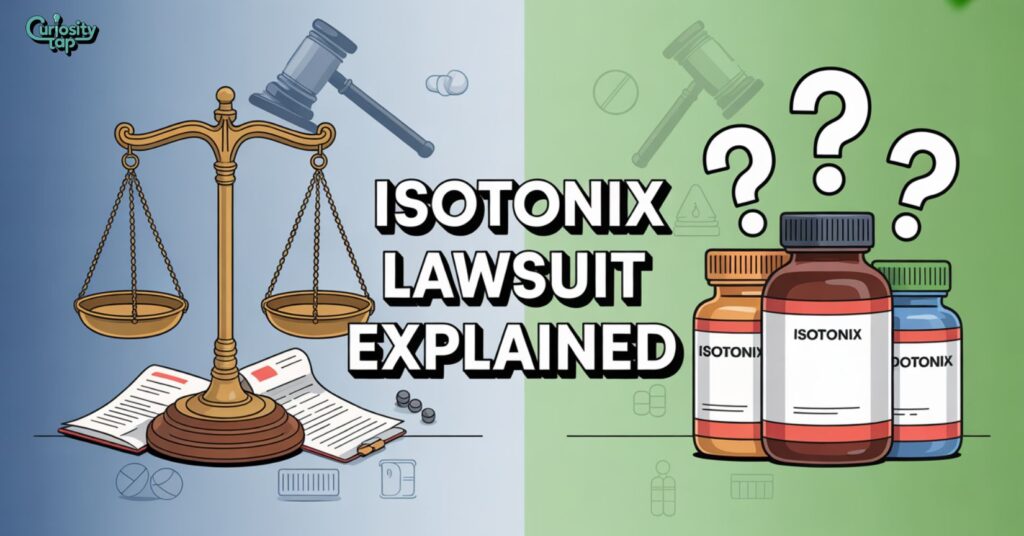Isotonix, a prominent dietary supplements brand under the MLM umbrella of Market America, has become a focal point in legal debates over marketing practices, regulatory compliance, and MLM ethics.
In this article we’ll unpack the Isotonix lawsuit, examine FDA warnings, explore pyramid scheme allegations, and help you understand what it means for consumers, distributors, and the supplement industry at large.
What Is Isotonix?
Isotonix is a line of wellness products marketed as isotonic formulations meaning the supplement supposedly matches the body’s fluid pressure, allowing faster absorption into the bloodstream.
It includes vitamins, minerals, antioxidants, and blends (e.g. OPC-3).
But the key here is that many of Isotonix’s health claims such as “90% faster absorption” or broad benefits for heart disease, inflammation, or diabetes have drawn heavy scrutiny for lack of robust, peer-reviewed scientific backing.
Some critics argue these are unverified health claims rather than evidence-based statements.
Isotonix gained traction because it rode the wave of health supplement demand. Yet, as we’ll see, that success made it a target for legal and regulatory examination.
Ownership & Business Model: Market America and the UnFranchise System
Isotonix doesn’t operate alone. It functions under the umbrella of Market America, a direct sales company that uses a multi-level marketing (MLM) structure.
Key points about Market America’s model:
- Distributors are called UnFranchise Business Owners.
- They pay startup fees (historically ~$399) plus recurring costs to qualify for commissions.
- The business logic encourages recruitment and building a downline which is common in MLM setups.
- Market America does not according to public records manufacture its own supplements; it outsources to contract manufacturers.
So Isotonix sits at the intersection of supplement marketing, MLM structure, and retail claims. That intersection is a legal minefield.
The Lawsuit Against Isotonix / Market America
Contrary to what some might think, the legal pressure isn’t just on “Isotonix” as a product. The bulk of it centers on Market America’s business practices and how Isotonix has been marketed.
Some lawsuits refer to “Isotonix lawsuit” as shorthand for actions against Market America tied to Isotonix’s claims and distributor structure.
Who Filed & Why
- In March 2017, a class action lawsuit was initiated accusing Market America of operating a pyramid scheme, making false income claims, and deceptive marketing practices.
- Distributors and consumers claimed they were misled about how much they could earn, and that revenue largely flowed to people at the top of the hierarchy.
- Plaintiffs alleged that over 90% of distributors lose money, while a few at the top reap large benefits.
Timeline & Key Milestones
| Year / Date | Event | Notes |
|---|---|---|
| March 2017 | Lawsuit filed | Complaints of pyramid scheme, false income claims |
| 2018 | Class certification efforts | Plaintiffs seek to unify claims across many distributors |
| Feb 2020 | FDA Warning Letter to Market America | Cited misbranding, failure to submit serious adverse event reports |
| 2020 | Truth in Advertising investigation | Over 450 deceptive income claims found; company removed ~750 marketing claims |
| 2021–2022 | Settlement talks / business model adjustments | Market America reportedly changed marketing and labeling practices |
| 2023 onward | Ongoing monitoring / compliance review | Legal scrutiny remains active |
Key Legal Claims
- False Income Claims: Promising distributors large earnings without realistic support.
- Deceptive Marketing Practices: Overstating product performance (e.g. absorption, health benefits).
- Pyramid Scheme Allegations: Prioritizing recruitment over actual consumer sales.
- Labeling Issues / Misbranding: Products being marketed in a way that violates Consumer Protection Laws and FDA rules.
- Failure to Report Adverse Events: Ignoring regulatory obligations to log serious health events tied to products. (See the FDA Warning Letter)
FDA & FTC Involvement: Warnings, Letters & Investigations
No major supplement-MLM case avoids scrutiny from the FDA or FTC. Isotonix/Market America is no exception.
FDA Warning Letter to Market America
On February 12, 2020, the FDA (Food and Drug Administration) issued a Warning Letter to Market America, detailing serious violations found during inspection of their facility in Greensboro, NC.
Some key findings:
- Failure to submit Serious Adverse Event Reports (SAERs): Complaints of hospitalizations, dizziness, vomiting, numbness, and more after using products (TLS Nutrition Shake, Isotonix OPC-3, etc.) were not reported.
- Misbranding / labeling violations: The supplement labeling did not conform to FDA standards.
Because dietary supplements are regulated under the Federal Food, Drug, and Cosmetic Act (FD&C Act), the FDA requires companies to follow strict rules on labeling, claims, and reporting adverse events.
Violating those rules can trigger regulatory action, including product seizure, injunction, or forced corrective measures.
FTC & Deceptive Marketing / Income Claims
The FTC (Federal Trade Commission) enforces rules against false or misleading advertising. In the case of MLMs, it closely watches income claims and misleading promotional statements.
- In 2020, the FTC and FDA jointly sent warning letters to several companies for making unsubstantiated claims (especially during COVID-19).
- Market America has faced scrutiny from Truth in Advertising, which flagged over 450 deceptive income claims in 2020. The company expunged ~750 marketing statements under pressure.
- Allegations in the class action suit claim that Market America’s income disclosures mislead prospective distributors by showcasing top-earner data without context.
This dual oversight (FDA for product claims and FTC for marketing practices) puts the company under regulatory oversight from multiple angles.
Also Read: How To Maximize ZardGadjets With This Complete Online Tool Guide
Pyramid Scheme Allegations: Does Market America Cross the Line?
Before dismissing these claims, we need to understand what legally defines a pyramid scheme versus a legal MLM.
What Constitutes a Pyramid Scheme
Under U.S. law, a business crosses into illegal territory when:
- Compensation is based more on recruiting than product sales.
- Products are overpriced or lack independent demand.
- Participants must make continual purchases (inventory loading) to stay active.
- The scheme relies heavily on the promise of future recruitment and payments down the line.
If the primary focus is recruitment over retail, regulators may call it illegal.
How Market America / Isotonix Claims Fit
- The 2017 class action lawsuit alleges that distributors had to pay $399 upfront and $129 monthly, plus purchase $130/month from Shop.com, in order to maintain status.
- It claims 90% of distributors lose money, and that the only way to profit is by getting a large downline.
- The complaint says Market America encourages recruitment over direct customer sales.
- Some claimed the cost of the products to distributors was inflated compared to market value, and that they were prohibited from selling outside certain channels.
Because of these elements, plaintiffs argue they meet the common signs of a pyramid scheme.
Comparison: Other MLM Cases
| Company | Outcome / Action | Key Lessons |
|---|---|---|
| Herbalife | Paid ~$200 million FTC settlement (2016) | Required to change compensation and compliance structure. |
| AdvoCare | Banned from MLM model by FTC | Shifted to single-level direct sales model |
| Market America | Ongoing legal scrutiny & class actions | Reflects how regulatory pressure targets MLMs |
These cases show regulators will take serious action when they believe an MLM has crossed the line.
Market America’s Response & Adjustments
Faced with lawsuits and regulatory pressure, Market America has taken steps to address criticism.
Public Statements & Denials
- The company has issued official responses denying that it operates as a pyramid scheme.
- It emphasizes that compensation is tied to product sales, not just recruitment.
- It asserts it will cooperate with regulators and improve compliance training for distributors.
Changes to Marketing, Labeling & Business Model
- Under pressure from Truth in Advertising, Market America removed ~750 marketing/income claims in 2020.
- It claims to have updated labeling and compliance policies for Isotonix products to reduce regulatory risk.
- It reportedly increased training and oversight for distributors to reduce false claims.
- Some core business adjustments were made around 2022 to better align with compliance expectations.
These steps indicate the company is actively responding to ongoing legal scrutiny.
Risks & Implications for Distributors and Consumers
Let’s cut to the chase: this isn’t just legal drama. It affects real people who sign up, sell, or consume.
Risks for Distributors (Current & Prospective)
- Financial Loss: The 2017 lawsuit claims that many distributors lose money.
- Reputation Risks: Association with companies under legal or regulatory fire can damage credibility.
- Legal Liability: Distributors making unverified health claims or income promises could be personally liable.
- Reduced Growth / Recruitment: Negative publicity makes recruiting harder.
- Policy Changes: Company may tighten commission rules, limit product lines, or restrict marketing claims.
Risks for Consumers / Customers
- Misleading Health Claims: Supplements that overpromise may fail to deliver expected results.
- Product Safety Concerns: Labeling or reporting violations suggest possible risks.
- Trust Erosion: Seeing legal actions shake confidence in the brand.
- Difficulty Seeking Recourse: If claims are false, class certification or individual lawsuits can be long, complex processes.
Similar Cases in the Supplement & MLM Sector
Taking a broader view helps us see where Isotonix fits in the legal landscape of supplements and MLMs.
| Case | Issue / Allegation | Outcome / Impact |
|---|---|---|
| Herbalife | Accused of deceptive income claims & pyramid scheme | Paid $200M to resolve FTC claims, restructured compensation |
| AdvoCare | MLM model declared unlawful by FTC | Shifted business to non-MLM model |
| Market America / Isotonix | Ongoing legal scrutiny and class actions | Still under regulatory oversight |
These cases emphasize:
- Regulators treat supplement/MLM combinations as high risk.
- Compensation structures and marketing practices are under tight scrutiny.
- Legal settlements often lead to business model changes or bans on MLM operations.
Also Read: Fishing Guides ThunderOnTheGulf: Your Ultimate Gulf Coast Fishing Adventure
Key Takeaways: What You Should Do
Here are actionable lessons whether you’re a consumer or considering joining as a distributor.
- Do deep research: Look up legal actions, warning letters, and independent testing.
- Avoid exaggerated income promises: Treat them with suspicion if unsupported by data.
- Watch product claims carefully: Especially those that say they “prevent disease” or cure serious conditions (these are often unapproved drug claims).
- Check regulatory databases:
- FDA Warning Letters: FDA site (U.S. Food and Drug Administration)
- FTC case files: FTC site
- Keep documentation: Purchase records, marketing materials, distributor agreements.
- Consult professionals: Talk with a health care provider before using supplements and an attorney if joining MLMs.
FAQs
Is there an active “Isotonix lawsuit”?
Not exactly against the product alone, but Market America faces multiple class actions tied to Isotonix and its promotional model.
Are Isotonix products still on sale?
Yes. Despite regulatory warnings and legal scrutiny, they remain available via Market America distributors and their online channels.
Is Isotonix safe to use?
Many consumers report no harm. But the FDA Warning Letter flagged failure to report serious adverse events, which raises concerns around transparency and oversight.
What did the FDA warning letter specify?
It cited misbranding, labeling violations, and failure to submit serious adverse event reports.
Can I join a class action suit now?
That depends on whether class certification is still open. Consult a consumer rights attorney or class action website for current status.
Is Market America still operating via MLM?
Yes. However, they claim to have made compliance and marketing adjustments to reduce legal exposure.
Conclusion: What You Need to Know Before Trusting Isotonix
The Isotonix lawsuit isn’t just a legal battle it’s a case study in how supplements, marketing, and MLM models intersect under regulatory frameworks.
- Market America faces pyramid scheme allegations, false income claims, and labeling violations.
- The FDA Warning Letter in 2020 exposed serious lapses, especially in reporting health events.
- While the company has responded by removing marketing claims and promising reforms, ongoing legal scrutiny remains.
For you, the takeaway is this: don’t accept hype. Demand transparency, verify claims, and protect your health and finances. When something sounds too good to be true, it often is.
If you like, I can also prepare a feature article comparing the Isotonix case with Herbalife, AdvoCare, and other supplement MLM lawsuits. Want me to do that next?
Read more knowledgeable blogs on Curiosity Tap
Is this article helpful?

Jackson Pearson is a passionate educator and language enthusiast behind the blog Jackson Pearson. With years of experience in teaching and writing, he specializes in simplifying complex grammar rules, breaking down tricky vocabulary, and crafting learning guides that are both engaging and practical. His mission is to help readers boost their English skills whether they’re beginners or brushing up for fluency. Through every article, Jackson brings clarity, structure, and a spark of curiosity to the world of English learning.



